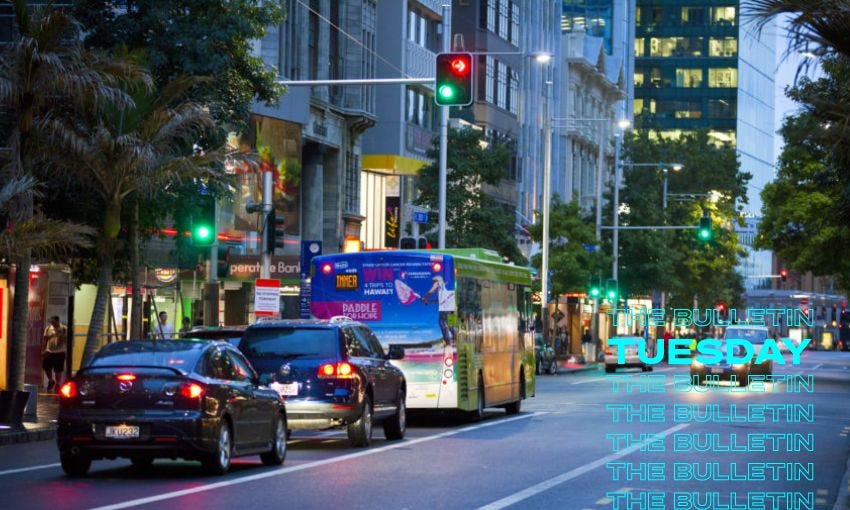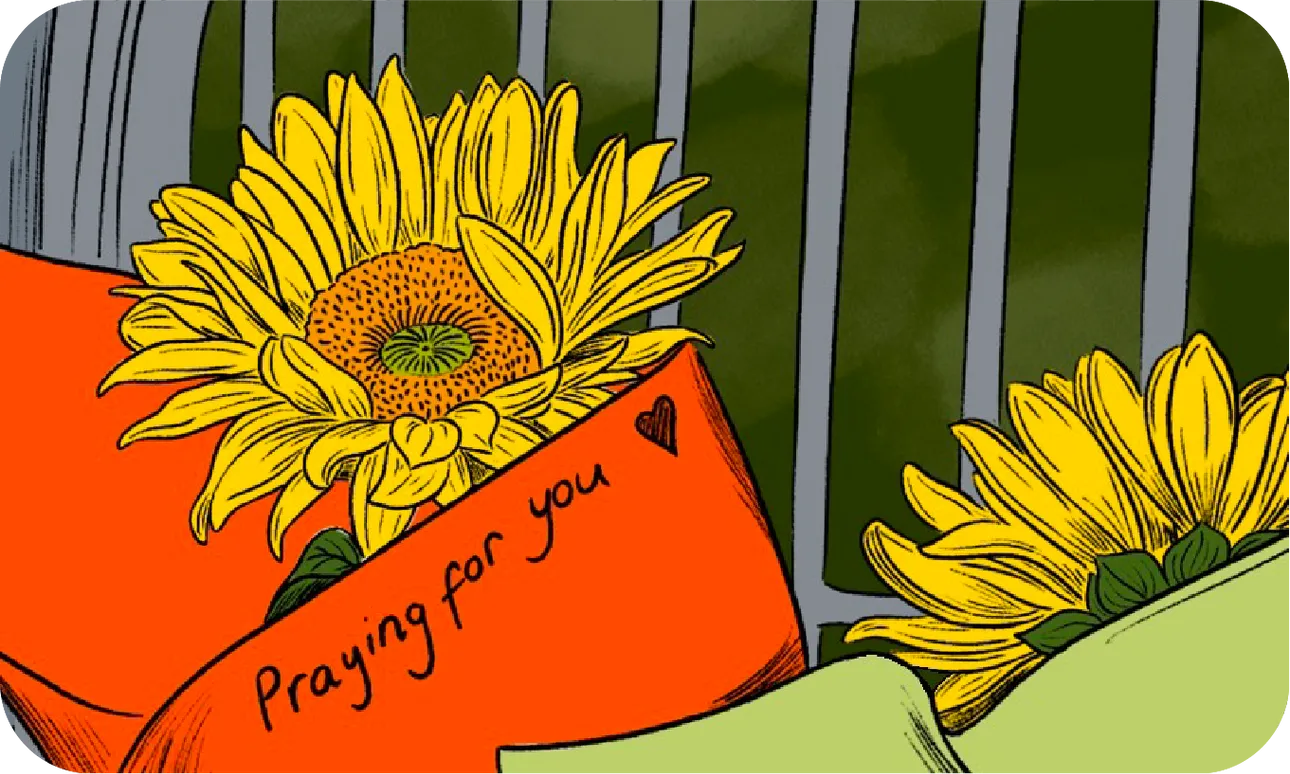Three month cut to fuel taxes, transit fares
Beehive unveils package to cut transport bills as New Zealanders face soaring cost of living
Mōrena and welcome to The Bulletin for Tuesday, March 15, by Justin Giovannetti. Presented in partnership with Z Energy.
In today’s edition: Auckland Council struggles with climate plan; three year anniversary of Christchurch attacks; border to open earlier for tourists; but first, a three month cut to transport costs.
It’ll be cheaper to be in traffic and avoid it on the bus. (Getty Images).
Fuel taxes will be cut by 25 cents a litre for three months.
A “global energy crisis” unleashed by Russia’s invasion of Ukraine has meant New Zealand’s petrol prices have increased by the highest amount on record, the prime minister said yesterday. To help motorists adjust to the volatile situation, the government is cutting the fuel excise duty and road user charges for three months. The cut happened overnight. As The Spinoff’s live updates reports, the changes to the fuel tax will lead to a potential saving of between $11.50 to $17.25 per tank of petrol. That should bring prices back to where they were three weeks ago. The three month cut will cost the Treasury a whopping $350 million and could be extended if the price situation doesn’t improve.
“While forecasters predict inflation will peak and subside over the coming year, there is less certainty around fuel costs due to the volatility of Russia’s invasion of Ukraine,” Jacinda Ardern said at parliament.
Public transit fares will also be halved to give commuter more options.
Unlike the cut to fuel taxes, it’ll take the government some time to negotiate how to cut fares as local authorities are responsible for public transit. The central government will reimburse transit operators for the lower revenues coming into fare boxes. The finance minister told RNZ that he expects councils will welcome the news and work to push it through. The programme is expected to cost between $25 to $40 million for three months. It could be an interesting case study in whether lower fares drive usage. According to Google’s mobility data on Aotearoa, much of the country is close to normal compared to pre-Covid times, except public transit use, which is still down by 54%. After two years of pandemic, the majority of bus and train riders haven’t returned.
Service stations have promised to pass on the savings to the public.
The government has asked oil companies not to pocket the tax reduction and most have promised to do so. Mobil dropped prices immediately across its network yesterday. Z Energy, BP and Gull told Stuff they’ll pass on the savings to consumers. Trust, but verify, could be the energy minister’s moto on the promises. She said the government will publish the profit data from oil companies, so if any start to dip into the tax cut, the public will know. If you’re not quite sure how fuel taxes work in Aotearoa, Henry Cooke has written an explainer for Stuff. About 48% of every litre is tax, but it’s complicated.
The government’s road building programme won’t be impacted.
All the tax that’s being cut was reserved for the infrastructure fund. There are already more projects than money, so there’s no room to cut back on spending. Instead the government is dipping into what’s left of the Covid fund to fill up the roads budget. This could be a taste of what’s to come. As the government pushes forward with its climate programme, fuel taxes could be phased out in the coming years, according to the NZ Herald. The country will be looking at new ways to fund infrastructure as electric vehicles become more popular and petrol taxes less relevant.
The next few months will be deeply uncertain.
The prime minister quipped yesterday, as questions from reporters shifted from Ukraine to Covid: “That’s fine, we can move between wars and pandemics”. It was grim and a sign of what’s to come. A lot of the new cash being splashed about in the Beehive is only possible because the economy has outperformed expectations month-after-month for most of the past two years. Between the omicron wave which has meant people staying home and spending less, as well as the global wrecking ball of war, it’s likely a recession is ahead. Interest has looked at what could be the strangest recession in some time. The happy finance minister ready to open up the national purse today could have a very different outlook by budget day in May.
The generous support of our members powers all of The Spinoff's journalism, including live updates, the award-winning collaborations between Toby Morris and Siouxsie Wiles, and richly reported feature writing.
As we continue to struggle against commercial headwinds, contributions from our members are more critical than ever. If you value what we do and have the means to do so, please make a donation today and support our mahi.
Auckland Council struggles with spending climate plan budget.
Halfway through the first year of its climate action plan, Auckland Council has only spent $900,000 of a $10.5 million budget. As Stuff reports, less than half of the council’s planned work is on track. While Covid has caused delays, so has the council’s difficulty finding, attracting and hiring sustainability professionals to do the work. The whole programme is supposed to last a decade and is budgeted at $152 million. Richard Hills, who chairs the climate committee on council, said work has picked up in recent months, but recruiting difficulties remain.
Love on three year anniversary of Christchurch mosque attacks.
It was New Zealand’s darkest day, but Temel Atacocugu has found love with a journalist covering the aftermath of the massacre. The NZ Herald (paywalled) looks at the man’s struggle and painstaking recovery after being shot nine times. Atacocugu is finishing his Walk for Peace journey today, retracing the terrorist’s 360km route from Dunedin to Christchurch and raising money for charity.
Ardern to unveil plan for earlier border opening to tourists.
The border plan announced last month would open the country up to tourists by mid-year, but would require a week of self-isolation on arrival. The prime minister has indicated an earlier date for the reopening will be announced this week. It’s unclear if the self-isolation requirement will remain, as it was dropped for fully vaccinated residents two weeks ago. According to the NZ Herald (paywalled), tourism businesses say it will take months to get the industry up and running again. If self-isolation remains, they don’t expect many tourists to visit.
Questions surround funding of occupation outside parliament.
With a number of billboards, expensive court cases and millions of flyers, significant money was behind the groups involved in the nearly month-long Wellington occupation. As Tim Brown reports for The Spinoff, there’s almost no clarity about how much money or where it came from. The groups aren’t speaking, the police won’t talk about their investigation and politicians aren’t interested in getting involved. Hackers in Canada uncovered that less than 30% of donations for that country’s occupation were domestic, according to The Guardian. There’s been an unwillingness from the Beehive to engage with the funding here. The situations has echoes of the country’s political financing rules, which I’ve covered previously in The Bulletin, which are lax despite ample evidence of abuse and have a certain “it doesn’t happen here” quality to them.
Owners of vacant Christchurch lots will face incentives to rebuild.
More than 11 years after the Canterbury earthquakes a number of sections in downtown Christchurch remain vacant, overgrown and untidy. Council has reported numerous complaints from locals and visitors about the state of some lots. It now wants to use a stick to get a wider rebuild underway. RNZ reports that council is proposing to quadruple rates on lots that remain unimproved. Sites that are empty but kept tidy could apply for a reduction.
Monster spud actually a gourd, DNA test finds.
Doug the Spud’s time as the world’s largest potato is over before it began. The 7.9kg tuber was pulled from the ground in Hamilton last year, a little lumpy and misshapen, and a claim was sent to the Guinness book of records. However, a follow up DNA test found that the monster specimen isn’t a potato, Stuff reports. The spud’s owners are a little surprised by the finding, as Doug looks and tastes like a potato. They still want to turn the gourd into vodka.
Got some feedback about The Bulletin, or anything in the news? Get in touch with me at thebulletin@thespinoff.co.nz
Anjum Rahman reflects on what has and hasn’t changed after the March 15 terror attacks. Toby Manhire reports on how Islamophobia has spread in the past three years. Sam Brooks reviews new talent show 60 Seconds. Tara Ward has a recap on the latest episode of Outlander. Airana Ngarewa looks at how Te Korimako 94.8FM has kept the Taranaki dialect alive.
Barcelona wants to host America’s Cup as decision nears.
The Spanish city has entered a bid to host the cup just two weeks before a final decision is expected for the venue of the 2024 race. According to Stuff, Barcelona was working on the bid for some time but kept the project quiet. There are now four cities on the shortlist, including Malaga in Spain, Cork in Ireland and Jeddah in Saudi Arabia. The host is expected to be announced by Team New Zealand on March 31.














If the 18c a litre ETS fee is supposed to encourage people to use less petrol, what does the 25c a litre subsidy say? The price just gets to a point where some people will say they can't afford it, and the government helps them keep driving? Why not just give people $50 and let them choose whether to spend it on petrol or food?
Decent Vodka is made with grain, not gourds, just sayin